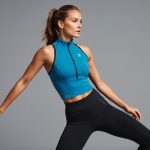Overview of Sustainable Activewear
In recent years, the demand for sustainable activewear has significantly increased as more consumers prioritise eco-conscious fitness choices. Sustainable activewear refers to fitness clothing produced with minimal environmental impact. This includes the use of recycled materials, organic fabrics, and environmentally friendly dyes. Ethical production methods are also a critical part of these brands’ missions.
The UK’s market for eco-friendly fitness apparel is growing rapidly. Brands are emerging that focus on offering environmentally friendly clothing options for the fitness community. These companies are not only committed to reducing their carbon footprint but also aim to encourage a healthier lifestyle for their customers by promoting sustainable clothing choices. Products in this sector range from leggings and sports bras to jackets and shoes, all designed with sustainability in mind.
In the same genre : Top Vegan and Cruelty-Free Fabrics Revolutionizing UK Fashion Choices
Choosing sustainable brands for fitness activities comes with multiple benefits. They offer high-quality products while supporting ethical labour practices. Furthermore, they contribute to the reduction of waste and pollution—fostering a positive impact on our planet. For individuals passionate about both fitness and sustainability, investing in eco-friendly activewear is a choice that aligns personal health goals with broader environmental responsibility.
Top Sustainable Activewear Brands in the UK
Sustainable fashion is reshaping the way we think about style and eco-friendly apparel. Here’s a look at some leading UK activewear brands making waves.
Also read : Top Eco-Conscious Outerwear Brands in the UK: Discover Sustainable Style!
Brand 1: [Brand Name]
This brand is setting the standard in sustainable fashion by using eco-friendly materials such as organic cotton and recycled polyester. Their innovative approach to design includes breathable and durable fabrics, ideal for any active lifestyle. Customers rave about the comfort and style of their products, though some note the premium pricing reflects their quality and sustainability.
Brand 2: [Brand Name]
Focused on environmental impact, this brand boasts an array of certifications that highlight its commitment to greener practices. They offer a diverse product range, from leggings to tops, each designed with unique eco-friendly features. Reviews often praise their quality and functionality, while the average price points remain accessible to many.
Brand 3: [Brand Name]
This brand proudly shares its mission to promote sustainability through activewear. With key products such as eco-conscious sports bras and shorts, they maintain a balance between performance and planet-friendly choices. The price range is competitive, and customers appreciate the dedication to sustainability, often reflected in high satisfaction rates.
Understanding Eco-Friendly Practices in Activewear
In recent years, the importance of eco-friendly practices in the activewear industry has grown considerably. Consumers are becoming more conscious of the need for sustainable materials and ethical manufacturing processes in their athletic gear.
Activewear brands increasingly use organic cotton and recycled polyester, both known for reducing environmental impact. Organic cotton is cultivated without harmful chemicals, helping to protect soil and water ecosystems. Recycled polyester, derived from post-consumer plastic waste, reduces landfill contributions and conserves fossil fuels. By using these materials, brands can significantly decrease their carbon footprint and promote a more sustainable industry.
In addition to material choice, ethical manufacturing plays a crucial role in eco-friendly practices. This involves ensuring fair labor conditions, reducing waste, and minimizing harmful emissions during production. Ethical manufacturing secures the well-being of workers while fostering transparent and environmentally conscious practices.
Adopting sustainable practices benefits not only the environment but also the communities connected to these industries. They lead to healthier living conditions and promote economic stability by supporting fair trade initiatives. By understanding and engaging with these practices, consumers contribute to a positive impact on both a global and local scale.
Tips for Selecting Sustainable Activewear
When selecting activewear, an essential step is making eco-conscious choices. Look for key factors such as material and origin. Prioritize natural, recyclable, or biodegradable fibers. For instance, organic cotton or recycled polyester are better for the environment. These materials decrease waste and use fewer resources in production.
To identify genuine eco-friendly products, learn to read labels. Look for eco-certifications like Global Organic Textile Standard (GOTS) and OEKO-TEX. These certifications ensure the product meets high environmental, safety, and social standards. Familiarity with these symbols aids in making informed sustainable shopping choices.
Beyond sustainability, consider fit, comfort, and performance. Activewear should provide ease of movement and wick away sweat. A poorly-fitting item, no matter how sustainable, won’t meet your performance needs. Therefore, always test the garment for comfort and functionality.
Other sustainable shopping tips include supporting brands with transparent practices, ensuring fair labor conditions. Research brands’ sustainability reports or commitments online. The balance of sustainable principles and practical usage ensures optimal performance and environmental responsibility.
The Future of Sustainable Activewear in the UK
In recent years, the future of sustainability in the activewear sector in the UK has witnessed incredible advancements. Key trends highlight a growing shift towards materials like recycled polyester and organic cotton. Brands are increasingly adopting sustainable practices, driven by escalating consumer demand for ethical products. This burgeoning market is characterized by transparency, with consumers prioritizing brands that disclose sourcing and production methods.
The trends in activewear point towards not only sustainable materials but also innovative manufacturing techniques. For instance, waterless dyeing and biodegradable materials are gaining traction among eco-aware manufacturers. These trends reflect the urgent need to reduce environmental impact while maintaining performance standards of fitness clothing.
The eco-conscious market growth is strongly influenced by consumer preferences, pushing brands to adapt or risk losing market share. As sustainability becomes a priority, it’s not just about the product but the entire lifecycle, including packaging and shipping. The role of education is significant as consumers become more discerning and demand becomes more informed. This dynamic is reshaping the activewear industry, where sustainability isn’t just a trend but a fundamental aspect of product development and brand identity.











